Scuba diving is a thrilling, life-changing experience that allows you to explore the depths of the ocean and experience its wonders firsthand. However, for beginners, the thought of diving can be intimidating. To ensure a safe and enjoyable experience, here are the top 10 scuba diving tips for beginners.
Get Certified
Before attempting any scuba dive, it’s important to get certified by a reputable professional dive center or instructor. This will ensure you understand the basics of diving and are familiar with the necessary safety protocols.
Research Your Dive Site
Before diving, it’s important to research the dive site and familiarize yourself with the conditions, marine life, and any other potential hazards.
Invest in Quality Gear
Investing in quality scuba gear is essential to any safe dive. Take the time to research and find the gear that fits properly and is in good condition.
Practice Under Supervision
Before attempting a dive, practice in the pool or shallow water with an instructor or dive buddy. This will help you gain confidence and become more comfortable with the gear and diving techniques.
Pace Yourself
Scuba diving is an aerobic activity and requires a certain level of fitness. It is important to take breaks throughout the dive and to never push yourself beyond your limits.
Plan Ahead
Prior to any dive, it’s important to plan ahead and discuss the dive with your dive partner. Plan the route, depth, and dive time.
Monitor Your Air
During the dive, it is important to monitor your air consumption and never exceed your predetermined dive limit.
Use the Buddy System
It is important to always dive with a buddy. This ensures that you always have someone to help if needed and reduces the risk of getting lost or into trouble underwater.
Be Aware of Your Surroundings
Pay attention to your surroundings and be aware of any potential hazards. This includes other divers, marine life, and currents.
Have Fun
Above all, remember to have fun and enjoy the experience!
Following these tips will help ensure a safe and enjoyable scuba diving experience. With the right preparation and knowledge, you can make the most of your underwater adventure.
FAQ’s
-
What is the safest depth to scuba dive?

The safe depth for scuba diving is generally considered to be 130 feet (40 meters) or less. Beyond that, the risk of nitrogen narcosis, oxygen toxicity, and other dangerous conditions increases significantly. However, the exact safe depth can vary depending on factors such as the diver’s level of experience, training, and physical condition, as well as the dive conditions and type of diving being performed. For most recreational divers, a depth of 60-100 feet (18-30 meters) is recommended. It is important for divers to understand and follow safe diving practices to minimize the risk of injury or death.
-
Is Scuba diving hard for beginners?
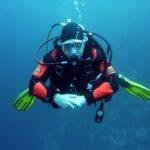
Scuba diving can be a challenging activity, especially for beginners. However, with proper training, practice, and guidance, most people can learn to scuba dive and enjoy the underwater world safely.
Scuba diving requires physical exertion, mental focus, and good communication skills. You need to be comfortable with the gear and equipment, be able to regulate your breathing, control your buoyancy, and navigate underwater. You also need to have a good understanding of diving physics, decompression theory, and dive planning.However, with the right training program, most people can master these skills and feel confident and comfortable diving. Certified scuba diving courses are widely available and taught by qualified instructors who provide hands-on training and practice in a controlled environment.
In conclusion, scuba diving is not necessarily hard for beginners, but it does require a level of commitment and training to ensure a safe and enjoyable experience.
-
What not to do before Scuba diving?
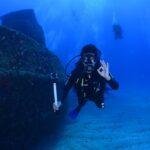
Before scuba diving, it is important to follow certain guidelines and avoid certain activities to reduce the risk of injury or illness. Here are some things you should avoid before scuba diving:
1- Eating a heavy meal: Eating a large or heavy meal can cause discomfort and increase the risk of a diver’s nausea. It is recommended to eat a light meal at least 2 hours before diving.
2- Drinking alcohol: Alcohol can dehydrate you and impair your judgment, making diving more dangerous. It is best to avoid alcohol for at least 12 hours before diving.
3- Diving with an illness: If you are feeling sick, have a fever, or have an infection, it is best to avoid diving. Some medical conditions can also make diving unsafe, so it is important to inform your dive instructor or dive leader.
4- Not getting enough sleep: Lack of sleep can affect your ability to make good decisions and react quickly in an emergency. It is important to get enough sleep before diving.
5- Not checking and testing your gear: Before diving, it is important to check and test your dive gear to make sure it is in good working order.By following these guidelines and avoiding these activities before scuba diving, you can help ensure a safe and enjoyable diving experience.
-
What are the three basic rules of Scuba?
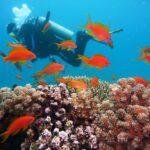
1- Plan your dive and dive your plan: This means having a clear understanding of the dive site, conditions, and any potential hazards before entering the water. It also means following a pre-determined dive plan, including dive time and depth, and making necessary adjustments based on changing conditions.
2- Never hold your breath: When scuba diving, it is important to continuously breathe and never hold your breath. Holding your breath can cause barotrauma, a painful injury caused by a sudden change in air pressure.
3- Keep track of your air supply: Air is a limited resource when scuba diving, so it is important to keep track of your air consumption and return to the surface before you reach the end of your air supply. This is especially important in case of an emergency, as having an adequate air supply is essential for a safe ascent.These three basic rules of scuba diving are crucial for ensuring a safe and enjoyable dive. Divers should always follow these guidelines and be aware of any additional dive rules specific to the dive site or conditions.
-
What foods to avoid when diving?

There are certain foods that should be avoided before scuba diving to reduce the risk of discomfort or illness while diving. These include:
1- High-fat or greasy foods: Foods that are high in fat or grease can cause discomfort and increase the risk of a diver’s nausea.
2- Spicy foods: Spicy foods can cause digestive issues and increase the risk of heartburn while diving.
3- Gas-producing foods: Foods that produce gas, such as beans, lentils, and broccoli, can cause discomfort and increase the risk of bloating while diving.
4- Foods high in sugar: High-sugar foods can cause energy crashes and affect your focus and concentration while diving.
5- Caffeine: Caffeine is a stimulant that can increase heart rate and blood pressure, making it harder to control breathing and buoyancy while diving.
It is recommended to eat a light meal at least 2 hours before diving and to avoid the foods listed above. Instead, it is best to eat foods that are easy to digest, such as whole grains, fruits, and vegetables, to ensure a comfortable and enjoyable diving experience. -
What happens if you stop breathing while diving?
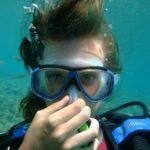
If a diver stops breathing while diving, it can be a life-threatening situation. The consequences of not breathing underwater can include:
1- Oxygen deprivation: Without a continuous flow of air, the body will quickly run out of oxygen and start to experience symptoms of hypoxia, such as confusion, dizziness, and unconsciousness.
2- Decompression sickness: If a diver ascends too quickly after experiencing a period of hypoxia, it can lead to decompression sickness, also known as “the bends.” This is a condition where nitrogen bubbles form in the bloodstream and can cause a range of symptoms, including joint pain, skin rash, and paralysis.
3- Carbon dioxide toxicity: If a diver continues to breathe recycled air from their scuba tank, they can experience carbon dioxide toxicity. This occurs when the level of carbon dioxide in the air becomes too high and can cause symptoms such as headaches, fatigue, and unconsciousness.
For these reasons, it is crucial for divers to continuously breathe and never hold their breath while diving. If a diver does experience breathing difficulties, it is important for them to immediately signal for help and ascend to the surface slowly and safely with the help of a dive buddy or safety personnel.

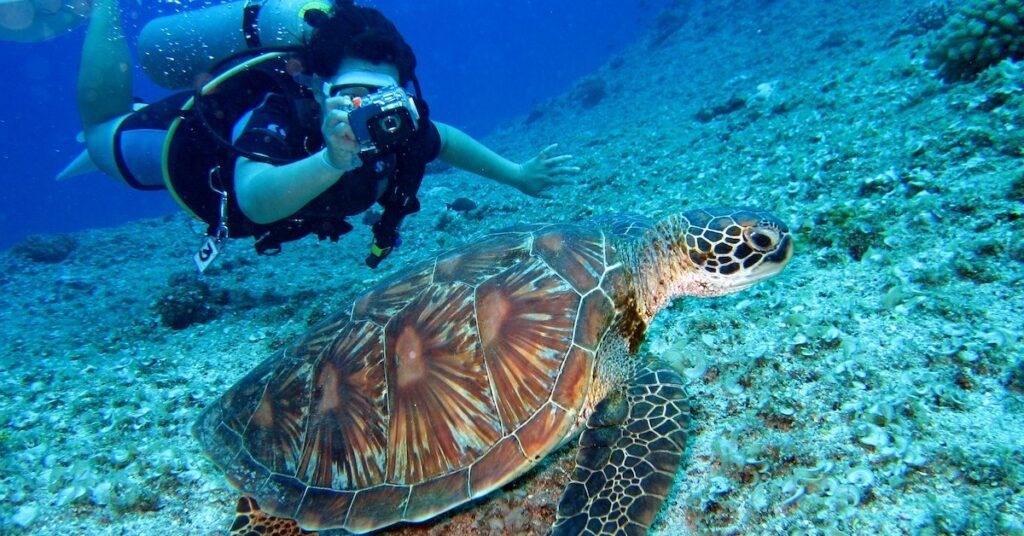

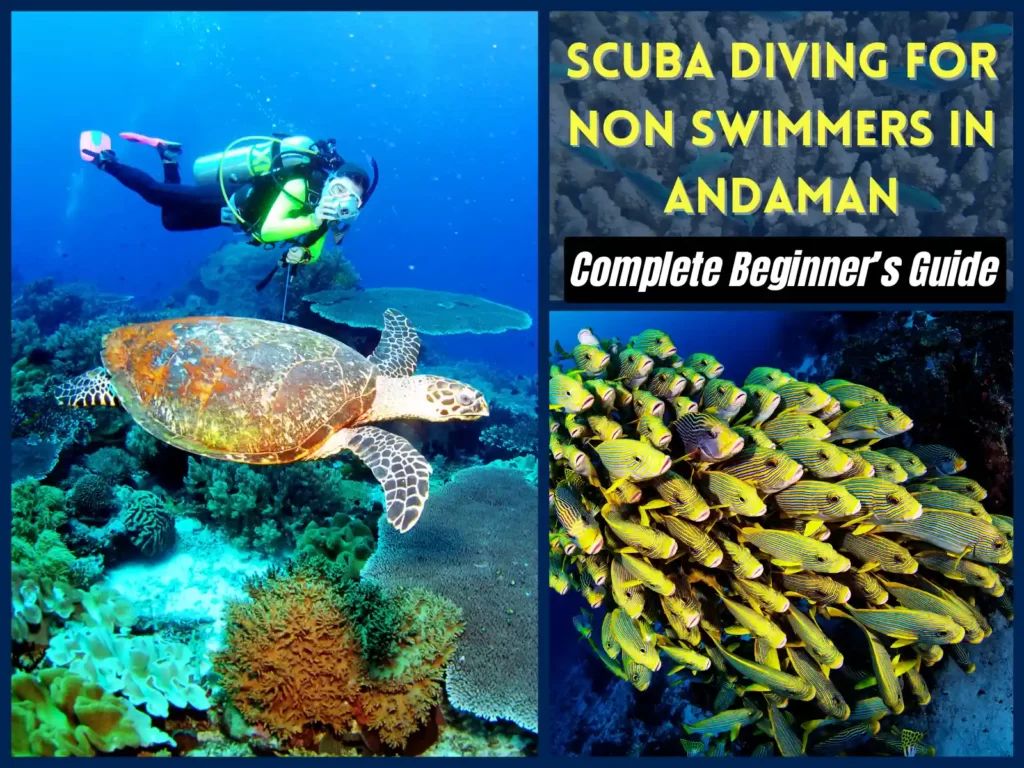

Pingback: Scuba Diving For Non Swimmers In Andaman (Tips & Tricks)